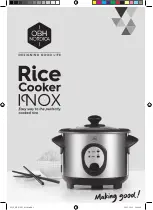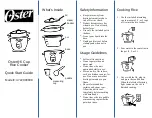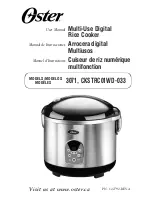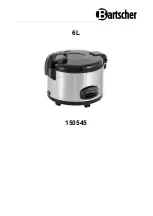
23
22
Cakes and pastry
Next time, use a little less liquid and bake for a little longer
but at a lower temperature. When preparing cakes with
soft toppings, bake the cake base first, then sprinkle
almonds or breadcrumbs onto it and finally add the
topping. Please follow the cooking instructions and baking
times.
Select a slightly lower temperature to ensure that the food
is cooked more evenly. Cakes that are inserted at the
same time will not necessarily be ready at the same time.
Allow the cake at the bottom of the oven to bake for 5 or
10 minutes longer at the end or, alternatively, put it in the
oven earlier.
Place the tray back into the oven again for a short period.
Now loosen the biscuits immediately. Next time line the
baking tray with non-stick baking paper.
Once baked, allow the cake to cool for 5 to 10 minutes, as
it will then be easier to remove from the tin.
If it still cannot be removed, carefully loosen the edge
using a knife. Turn the cake upside down again and cover
the tin several times with a cold, damp cloth. Next time,
grease the tin more intensely and line with non-stick paper.
The oven temperature is measured by the manufacturer by
means of a test shelf placed in the middle of the oven. The
measured value depends very much on the bakeware and
accessories being used, meaning that any measurements
carried out by yourself will produce different results.
Steam may be produced during baking, most escapes
through the steam outlet, some may condense on the cool
control panel front or the surrounding cabinets where it will
drip off. This will be dependent on the physical conditions.
The bread or cake (e.g.
cheesecake) looks good, but
is soggy inside (runny and
uncooked).
You were baking on several
levels. The food on the top
baking tray is darker than that
on the bottom baking tray.
The biscuits or cake will not
come off the baking tray.
The cake will not come out
when tipped upside down.
You have measured the oven
temperature using your own
thermometer and find that the
values deviate.
Condensation occurs when
baking wetter cake mixtures.
Cakes and pastry
Orientate your baking to similar items from the baking
tables.
Approximately 10 minutes before the end of the baking
time specified in the cooking instructions, pierce the
highest part of the cake using a wooden skewer. The cake
is ready if no mixture sticks to the skewer.
Next time, use less liquid or decrease the oven
temperature by 10 degrees. Follow the stirring times in the
cooking instructions.
Do not grease the edge of the spring form. After baking,
carefully loosen the cake using a knife.
Insert it on a lower level, select a lower temperature and
bake the cake for a little longer.
Insert it on a higher level and select a lower temperature
next time.
Select a slightly lower temperature to ensure that the food
is cooked more evenly. Sensitive pastry should be baked
using top and bottom heat and on one level.
Baking paper that protrudes over the food can influence
the air circulation. For this reason, always cut the baking
paper to fit the baking tray.
Use the deeper universal pan next time.
Use a skewer to pierce small holes in the baked cake.
Then trickle the fruit juice or liqueur over the cake. Next
time, select a temperature 10 degrees higher and shorten
the baking times.
What to do if ...
You wish to bake using your
own recipe.
You cannot tell whether the
Victoria sponge cake is
cooked through.
The cake falls apart.
The cake has risen in the
middle and is lower at the
edges.
The cake becomes too dark at
the top.
The cake becomes too dark at
the bottom.
The pastry is browned
unevenly!
The fruit cake is too light in
colour at the bottom. The fruit
juice flows over.
The cake is too dry.
Summary of Contents for HSS202M
Page 1: ...HSS202M HSS202MCC en Operating Instructions de Gebrauchsanweisung 9000048455 ...
Page 40: ...78 ...
Page 41: ...9000048455 ...













































